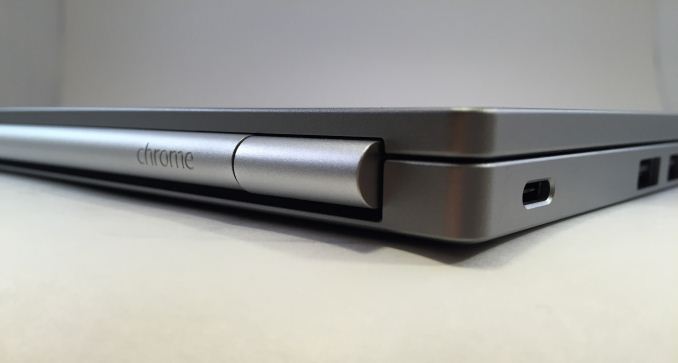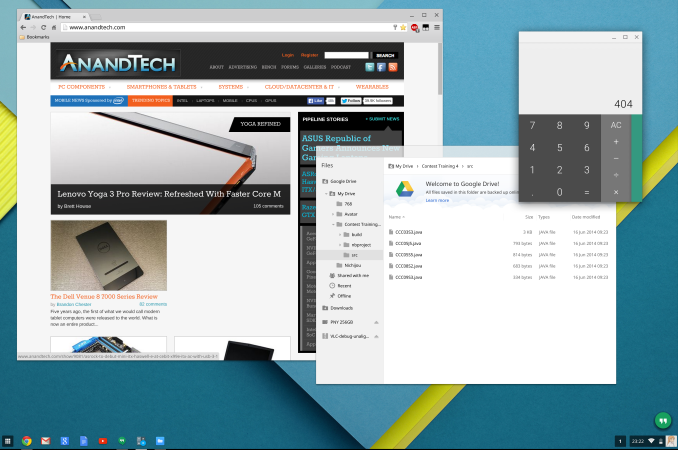The Chromebook Pixel (2015) Review
by Brandon Chester on March 16, 2015 8:00 AM EST- Posted in
- Laptops
- Chrome OS
- Chromebook
- Chromebook Pixel
Final Words
Despite its limitations, it's really hard to not like the Chromebook Pixel. Google has clearly put a lot of thought and effort into designing it, and what it does do it does really well. I think the move to USB Type-C is forward thinking, and makes the Pixel very versatile when it comes to connecting to both current and future displays and peripherals. The little details like tapping the top to see the remaining battery capacity, and the ability to charge on either side also help make it a very lovable laptop.
The Pixel's hardware is top notch. The build quality is every bit as good as what you'll get on a MacBook Retina, and both the keyboard and touchpad are comfortable to use. The CPU and RAM are completely overkill for running Chrome OS, but given that the Pixel has absolutely stellar battery life I'm not complaining about the additional hardware power. I think Google could have done more to calibrate the display, but in all honesty I doubt any users who buy the Pixel will be bothered by it, and it is still incredibly sharp.
The only big criticism I can really throw at the Pixel is the fact that its software is limited. But that is the entire point of how Chrome OS has been designed, and I do not know if it really makes sense to complain about something doing exactly what it was intended to do just because you wish it could do more. Chrome OS is definitely not the OS for everyone though, and although you can run other versions of Linux overtop, it's not exactly a real solution to the problem.
The final question is obviously whether or not someone interested in the Pixel should buy one. The answer is more complicated than a yes or a no. For anyone who wants to develop with Chrome OS in mind, the Pixel is the laptop to buy if it is within their budget. Other Chromebooks are definitely more affordable, but the Pixel is just so much nicer than any other Chromebook. I think that the Pixel can also be an appealing device for any user who can work within the limitations of Chrome OS, although I heavily stress that buyers make sure they know exactly what those limitations are before they spend $1000 on a laptop.
Google clearly doesn't intend for the Pixel to be a mass market item. It's quite expensive, it runs Chrome OS, and it's only sold in the US and the UK. There's clearly a small market for people that want a laptop like the Pixel though, and those are the people that Google are targeting. I am not one of them, and I do not know many people who are, but they do exist. In the end I find myself wishing that the Pixel could do more, because it's a genuinely nice laptop. I really like the Chromebook Pixel, but I personally just couldn't justify buying it.












123 Comments
View All Comments
Brandon Chester - Monday, March 16, 2015 - link
The issues with benchmarking it against other laptops are explained on the CPU performance page.MantasPakenas - Monday, March 16, 2015 - link
What I meant is that I don't see how those are issues. The issue that there are very few benchmarks you can run on a Chromebook? Yeah, sure. But where is the issue of including data points you already have for other laptops for these same benchmarks? E.g. here:http://www.anandtech.com/bench/Notebook/729
You also have charging times of normal laptops, as well as browsing and video playback battery life. Why not include those? I really don't see how comparing this to an iPad makes any more sense.
JarredWalton - Monday, March 16, 2015 - link
The "Light" and "Heavy" laptop tests are completely different than what we run on Chomebooks. The Light test uses IE10/11, cycling through a set of four open tabs. We could probably do this on a Chromebook, though we would need to modify it to make it work comparably (as the Windows Light test actually runs from a batch file).The Heavy test is a different matter. We're playing a 1080p video fullscreen, surfing the web with four pages loading every ~7 seconds, and downloading over FTP at 8Mbps. Without a good FTP client, this is pretty much impossible to do on a Chromebook. Plus on every other Chromebook other than the Pixel (and maybe the Core i3 Acer models) you won't be able to do all of these tasks without the video stuttering.
Bottom line is that most Chromebooks have hardware and pricing that's similar to tablets, so we use the tablet benchmarks for comparison.
MantasPakenas - Tuesday, March 17, 2015 - link
If I understand correctly, you're saying that it would be possible to benchmark the Pixel against it's real competition, but since most of the Chromebooks are underpowered, you are putting this monster up against much weaker devices. This still doesn't make sense to me. HP Stream 11 costs, performs and competes against Chromebooks, yet you measure it mostly against high end laptops (although C720 is included in some applicable benchmarks, and even an iPad Air in charging times). I question that approach as much as this case.Just as much as it makes sense to benchmark SSDs against other SSDs, low end phones against other low end phones, high end ones against iPhone 6 and tablets, it makes sense to benchmark the Pixel against high end laptops, because it deserves that treatment. Nobody is any wiser to know it can beat all tablets and budget chromebooks.
And I bet it wouldn't stutter playing a video, downloading and surfing the web at the same time. Yet I'm doing all those things concurrently on my HP Chromebook 14, and you bet I would do it on the Pixel!
jabber - Wednesday, March 18, 2015 - link
Indeed, I've seen plenty people pay $1200+ for a Macbook/Mac just to look at Facebook/Amazon because they didn't want to deal with Windows anymore.mekpro - Monday, March 16, 2015 - link
Nice review and really fast !I wish there are more extensive tests for USB Type-C, as this is the very first laptop to ship with it. I wonder what is the maximum resolution and how many external display supported ? Is the limitation come from the USB Type-C or Broadwell or the ChromeOS itself ?
Dumbledore147 - Monday, March 16, 2015 - link
Me too. I would love to see a setup with two 4k monitors running at 60 Hz while charging the chromebook.psychobriggsy - Monday, March 16, 2015 - link
The device, like the new MacBook, supports USB 3.1 Rev 1, otherwise known as USB 3.0 (i.e., 5 Gbps) on a USB Type C port (which adds charging, displayport, USB 2.0).We'll have to wait until Broadwell supports USB 3.1 Rev 2 for 10 Gbps data transfers.
tyger11 - Monday, March 16, 2015 - link
Type-C is a connector. The underlying port itself is a standard 5gbps USB 3.0 port. It's unfortunate they didn't go with USB 3.1, but neither did the new Apple MacBook Retina (even though they're calling it 'USB 3.1 Gen 1'. Ugh.JBVertexx - Monday, March 16, 2015 - link
This is a very targeted strike directly at the MacBook pro. The current market is very small, as many have commented on. I think an equally likely user is an account executive for companies that use the Google ecosystem.My company (a pre-IPO enterprise software company) uses the entire Google ecosystem. So, when I am traveling, I use either Gmail, Google docs, or some other web-based application for nearly 100% of my use. The percentage of time that I need to actually use MS Office is getting smaller and smaller.
When you compare this against the new 13-inch MacBook pro, the specs compare very favorably. The Pixel has a stronger processor (the 13" MacBook pro only ships with an i5), but the Pixel has much less storage space, clearly catering to cloud users (100% of what I store is in the cloud).
Google may be giving these away to developers, but I don't think that is the target audience for this. There is a small sliver of working professionals who will buy this over a MacBook pro. Google is using that niche market to improve the product, improve Chrome OS, and will over the next couple years be well positioned to be a serious competitor.